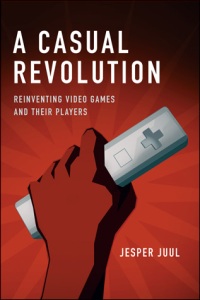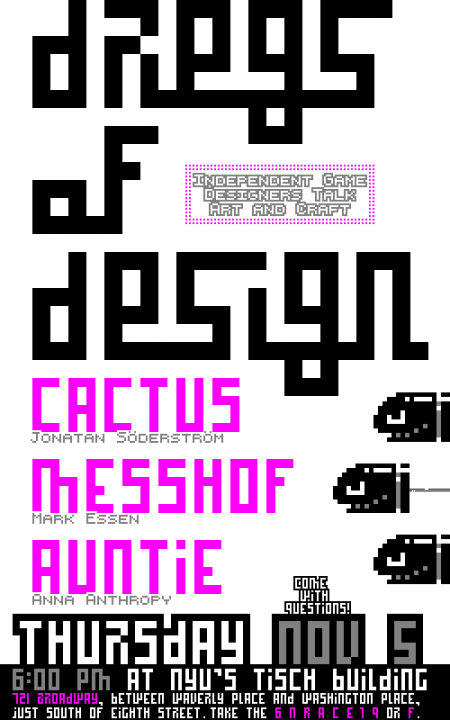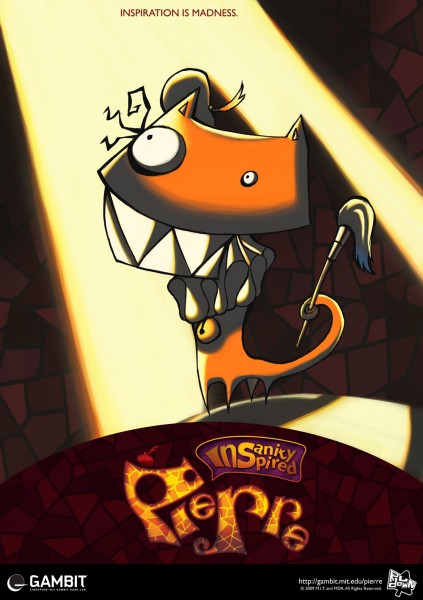The new issue 09/02 of Game Studies is out.
Contents
The Character of Difference: Procedurality, Rhetoric, and Roleplaying Games
by Gerald Voorhees
Abstract
This essay examines the cultural politics of the Final Fantasy series of computer roleplaying games. It advances an approach to games criticism that supplements Bogost’s procedural method with a thoroughly contextual approach to rhetorical criticism. By accounting for the narrative, visual and procedural representations in various iterations of the series, this essay argues that Final Fantasy games can also be understood as toys that allow players to experiment with different responses to cultural difference.
http://gamestudies.org/0902/articles/voorhees
———
Moral Decision Making in Fallout
by Marcus Schulzke
Abstract
Many open world games give players the chance to make moral choices, but usually the differences between good and evil paths through a game are slight. In order for moral choices in games to be meaningful they must be fairly calculated and have significant consequences. The Fallout series is one of the best examples of how to give players thoughtful moral problems and multiple paths to resolving them. This essay looks at the series, and Fallout 3 in particular, as examples of how moral choice can be incorporated into video games. One of the oldest fears about art is that it may corrupt observers and lead them to immorality – a criticism that has resurfaced with attacks on video games. Fallout 3 does the opposite. It encourages players to think about the morality of their actions in the virtual world, thereby teaching them the practical wisdom that Aristotle considered essential to being a moral actor.
http://gamestudies.org/0902/articles/schulzke
———
Cheesers, Pullers, and Glitchers: The Rhetoric of Sportsmanship and the Discourse of Online Sports Gamers
by Ryan M. Moeller, Bruce Esplin, Steven Conway
Abstract
In this article, we examine online sports gamers’ appeals to fair play and sportsmanship in online forums maintained by game developers. These online discussions serve to document and police acceptable behavior and gameplay for the larger community of game players and to stimulate innovation in game development, especially in online ranking systems.
http://gamestudies.org/0902/articles/moeller_esplin_conway
———–
World of Warcraft: Service or Space?
by Adam Ruch
Abstract
This article seeks to explore the relationship between the concept of Blizzard’s World of Warcraft in legal terms, in Blizzard’s End-User License Agreement (EULA) and the Terms of Use (TOU), and the concept of the game as conceived by the players of the game. Blizzard present their product as a service, and themselves as a service provider, in the EULA/TOU. Meanwhile, the product itself seems to be more akin to a space or place, which subjective players move about in. This conflict is essentially a difference between a passive viewer accessing certain content within a range available to him, and an individual who inhabits a space and acts within that space as an agent. The meaning of this subjectivity-in-space (or denial of the same) problematizes the relationship Blizzard has with its customers, and the relationships between those customers and Blizzard’s product.
An evolution of the governance of these spaces is inevitable. Where Castronova and Lessig’s answers differ, their basic assertion that the virtual political landscape can and will change seems clear. These changes will be influenced by the values placed on the social capital generated within the spaces themselves. The identities as per Turkle, Koster, and Dibble are human identities. Arguments as to why we should pay attention to synthetic worlds have been made by these authors already, so this article seeks to actually pay that attention. This is one practical example of the work that must be done around synthetic/virtual worlds, which directly affects tens of millions of people.



 From the not-so-
From the not-so-